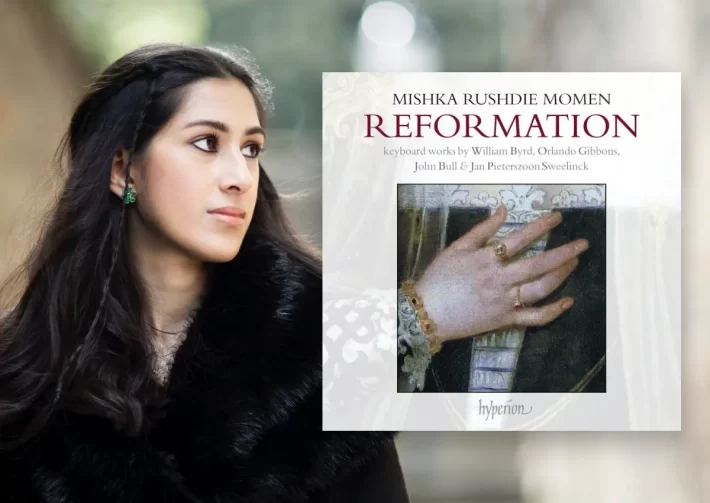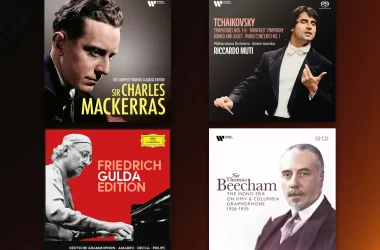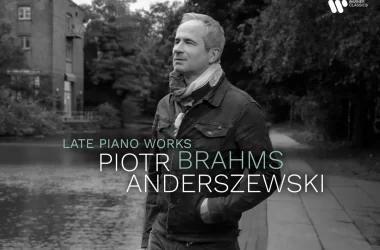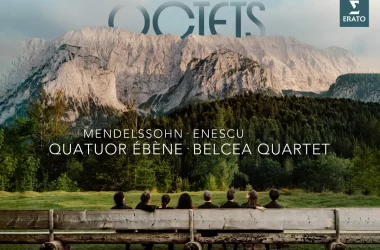Mishka Rushdie Momen’s album of Baroque keyboard music strucks as intriguing even before hitting play: her well-written foreword places the featured composers in the context of history and literature. Given the insightful connections she makes between different aspects of 17th-century England, I would have expected that she performs the works of William Byrd, John Bull, and Orlando Gibbons on period instruments or at least what comes as close as possible. However, she opts for a modern Steinway piano — a choice she firmly asserts is not anachronistic. She makes the claim that if the compositions could be performed on a variety of keyboards such as virginals, organs, and harpsichord during their time, why not the modern cousin now?
First up is Byrd, who was born at the end of Henry VIII’s rule. Although he held a prestigious post as Master of the Choristers at Lincoln Cathedral, his compositionally improvisatory ways earned him a reprimand at one point (and a suspension of his salary). This musical spirit is evident in Callino Casturame (track 1), not just in terms of the notes, but the way the pianist uses dynamics and different tone qualities. Listen, for instance, for her bolder approach in the second and more elaborate iteration of the original theme (0’20”); she also brings out an auxiliary inner voice to reveal an active dialogue. That she upholds the crisp rhythmic aspect also explains an interesting tidbit in her liner notes: Queen Elizabeth would often dance to Byrd’s music as a form of exercise.
The performance of Prelude and Fantasia (tracks 2-3) exemplifies why this is one of Byrd’s finest keyboard works: the Prelude is short but emotive, especially in terms of how resonant the runs and ubiquitous trills sound. Meanwhile the Fantasia, at nearly 8 minutes, offers several distinct ‘chapters’; Rushdie Momen’s unfailing clarity and lightness of sound nicely delineates the defining character of each chapter.
Byrd’s younger contemporary, John Bull, led a considerably more colorful life that landed him in trouble on more than a few occasions. This adventurousness translates to his music: the levity of My Self (track 10) is tinged with humor, especially when we expect to move to a minor key but are repeatedly greeted with a major chord. Rushdie Momen brings these small details out via shifts in dynamics and slight (but not overdone) pauses of emphasis. Although My Grief (track 11) may not sound all that tragic in terms of its melodic material and major key, the pianist approaches the lines with contemplation and tenderness.
Join The Classical Newsletter
Get weekly updates from The Classic Review delivered straight to your inbox.
The opening monologue of Walsingham (track 13) exudes a lovely lyricism that carries throughout the rest of the soprano part; however, it is the attention paid to the accompanimental figures that makes for an adventurous and interesting interpretation: at 1’29”, the buoyant staccatos and leaps in the base complement the move to A major. The result is an unexpected burst of energy that balances out the overarching dolefulness.
The mention of Byrd and Bull should not come without a reference to Orlando Gibbons: the three composers were responsible for publishing Parthenia, the very first volume of keywords works printed in England. Included in this anthology is Gibbons’ Pavane and Galliard (track 15-16). As the youngest of the three composers, his music is the most harmonically exploratory. The Pavane is full of fascinating dissonances and modality, which the performer uses to evoke a mysterious, ruminating presence. The Galliard, for its moments of delightful sprightliness, features some fantastic playing that underscores the instrument’s silky quality.
Rushdie Momen certainly harnesses the mellowness of modern piano to bring out the beauty of each of the works; At the same time, this also makes each composer’s unique stylistic voice slightly less discernible than if the instrument had been, say, a harpsichord. Still, this is a thoughtful and illuminating effort, and perhaps a great gateway for those less familiar with this genre before moving onto period instrument recordings.
Image: ©️ Benjamin Ealovega

Recommended Comparisons:
Gould | Amstrong | Johnstone | Belder
“Reformation“
Works by William Byrd, Orlando Gibbons, John Bull
Mishka Rushdie Momen – Piano
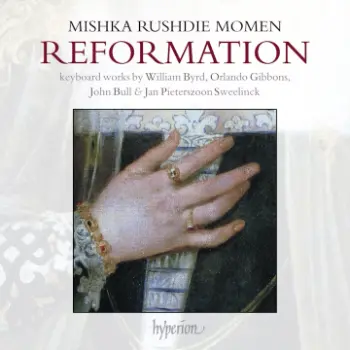
Check offers of this album on Amazon Music.
Album Details |
|
|---|---|
| Album name | Reformation |
| Label | Hyperion |
| Catalogue No. | CDA68445 |
| Amazon Music link | Stream here |
| Apple Music link | Stream here |

